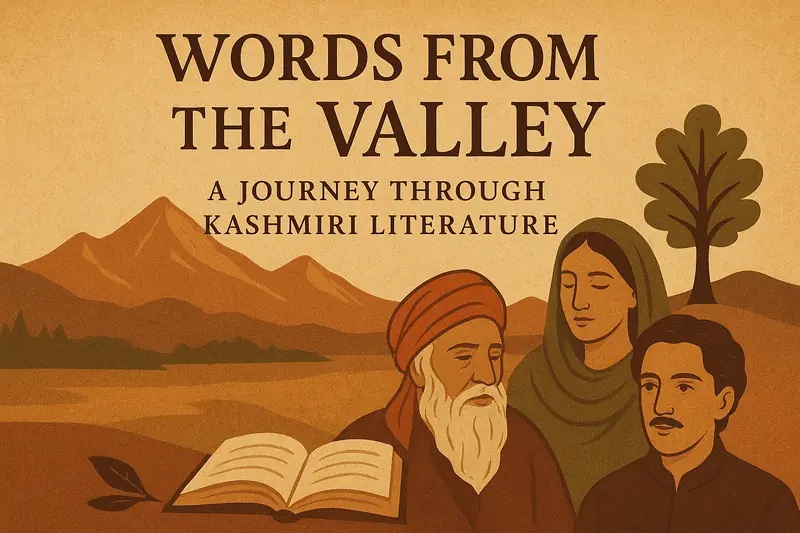Words from the Valley: A Journey Through Kashmiri Literature
From Lal Ded’s mystic verses to Agha Shahid Ali’s modern elegies, Kashmiri literature captures the valley’s soul — in love, loss, and longing.

In Kashmir, beauty doesn’t just live in mountains and meadows — it speaks.
It murmurs through words, sighs through verses, and breathes through stories that have outlived kings, conflicts, and countless winters. For centuries, Kashmir has written not with ink, but with soul.
Every Kashmiri grows up hearing about Lal Ded — the 14th-century mystic poetess whose vaakh (verses) still echo through the valley’s alleys and hearts. She questioned blind faith, patriarchy, and material greed long before the world had words for such rebellion. Her poetry wasn’t ornament — it was awakening. Alongside her walked Sheikh-ul-Alam (Nund Rishi) — the saint, poet, and philosopher who became the spiritual heartbeat of Kashmir. Born in the same century as Lal Ded, he carried forward her flame but grounded it in soil — turning mysticism into moral practice. Where Lal Ded questioned ritual, Sheikh-ul-Alam simplified faith. Where others preached, he lived the sermon — sowing fields, tending people, teaching compassion. Sheikh-ul-Alam shruks became the valley’s conscience, reminding generations that faith means nothing without care — for people, for nature, for truth.
Then came the dreamers. Habba Khatoon, the nightingale of Kashmir, turned longing into literature. Once a queen, later an exile, she sang of love that defied both royalty and reason. Her voice gave heartbreak a rhythm — soft, defiant, unforgettable. And then, Rasool Mir, the Keats of Kashmir, carried that melody forward. Where Lal Ded sought divinity, Rasool Mir sought the beloved — mortal yet miraculous. His poems blurred the lines between love and landscape, between desire and devotion. He turned heartbreak into heritage, giving Kashmiri poetry its tender heartbeat — lyrical, wistful, and profoundly human.
With time, poetry evolved — from mysticism and romance to reflection and realism. Rehman Rahi, Kashmir’s first Sahitya Akademi Award winner, gave new wings to the Kashmiri language. He fused classical grace with modern thought, reminding readers that tradition can grow without losing its roots.Then came Agha Shahid Ali, the poet who carried the valley across oceans. Writing in English, he turned memory into exile and pain into beauty. His collection “The Country Without a Post Office” remains one of the most haunting literary portraits of a homeland suspended between silence and sorrow.
“They make a desolation and call it peace.”
— Agha Shahid Ali
And yet, the story doesn’t end there. In today’s Kashmir, poets like Naseem Shafaie and Zareef Ahmad Zareef keep the tradition alive — her quiet introspection meeting his wit and satire. Their words prove that the Kashmiri pen never sleeps, even when the valley does. Because it records what news cannot. It remembers what politics forgets. And it whispers what pain dares not speak aloud.
To read Kashmiri literature is to walk through centuries of love, loss, and resilience — to feel the valley think, dream, and grieve. It’s to realise that here, even silence rhymes — and every word carries the weight of home.
“In Kashmir, even silence has poetry — you just have to listen.”